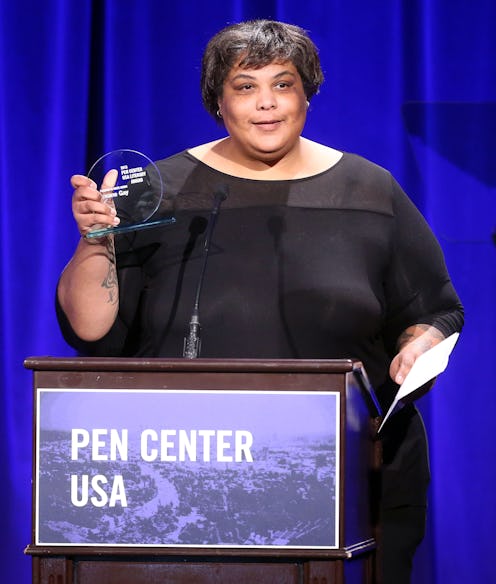Books
Book of the Month: 'Bad Feminist'

I have trouble admitting that as an editor for a feminist website, I've had a rocky relationship with the term "feminist" at points in my life. Although I've never openly rejected the label, it's a branding that, for years, I felt uncomfortable wearing. "I don't want to be put in a box," I said to my roommate in college when she asked me to wear a THIS IS WHAT A FEMINIST LOOKS LIKE T-shirt. What I really meant to say was, "I don't want someone to heckle me for being an angry chick."
I've since grown into my identity as a feminist, so I understand what Roxane Gay means when she calls herself a "bad feminist." Though the title of Gay's new essay collection was originally a joke, she thought about the words, and realized there was something to them. "I openly embrace the label of bad feminist," Gay writes in the introduction to Bad Feminist (Harper Perennial). She continues:
I do so because I am flawed and I am human. I am not terribly versed in feminist history. I am not as well read in key feminist texts as I would like to be. I have certain... interests and personality traits and opinions that may not fall in line with mainstream feminism, but I am still a feminist. I cannot tell you how freeing it has been to accept this about myself.
Bad Feminist is about feminism, of course — Gay writes on the problem of when "no" supposedly means "yes" in Robin Thicke's "Blurred Lines," and how 50 Shades of Grey is a detrimental portrait of both the happily-ever-after storyline and the BDSM community — but the book is a 360 degree picture of what it means to be a woman right now. That is its most feminist feat — giving witty, honest voice to often squelched narratives of issues essential to women, self-identifying as feminists or not, and anchoring them within recognizable beacons like Girls or Sweet Valley High for discussion and dissection.
And that's what makes Bad Feminist so purely good — its accessibility. Gay makes each essay eminently readable: appealing through humor; through empathy; through the irresistibility of pop-culture; and, yes, through channeling a little of that charged, feminist frustration that drives the passion of the movement. Therein, with strong conviction Gay tackles race, rape culture, societal power structures, politics, media, and history with a graceful sensibility the entire way through the collection. With her talent, she's conscious of the reader's experience and keeps each discussion compelling — although you know you are in masterful hands, you still feel like you're reading an email from your best friend.
Gay reveals snippets of herself like Hansel and Gretel leave breadcrumbs; in an essay about The Hunger Games, she works in the sexual assault that changed her life. Gay dares to bare snapshots of her history as the pieces go on, writing strongly from her perspectives as both a woman and a person of color, and the details build to form a picture of the author that gives even more context and meaning to her work. In this way, many of Bad Feminist's essays function as part personal narrative, part cultural criticism.
Although Gay's confessions about her past are significant, perhaps most revelatory about Gay's admissions are the things that make her a bad feminist. She reads "lowbrow" literature that doesn't explicitly espouse feminist values. She likes pink. She listens to objectifying music because, goddamn, it's catchy. It's easy to get consumed by Gay's world because you, too, have likely been "bad."
"I embrace the label of bad feminist because I am human," Gay writes as she wraps up the collection's intro. I am, too — so after reading Gay's work, I think back to the time where I didn't want to wear a FEMINIST T-shirt, and I don't feel as bad about it. I'm a bad feminist. That label looks just as good on me, so I think I'll wear it instead.